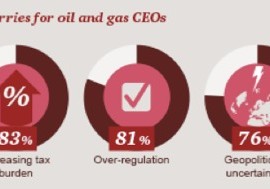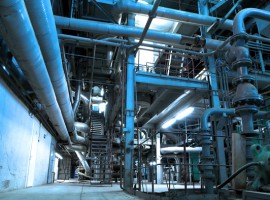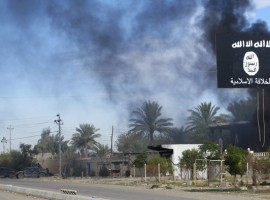Egypt is the largest oil and natural gas consumer on the African continent. Its large population of 86 million –second only to Nigeria– consumed 20% of oil and 40% of natural gas in Africa in 2013. However, not all of the petroleum products used like gasoline, diesel, and jet fuel are refined domestically. According to OPEC’s annual statistical bulletin, Egypt imported 170,000 b/d of petroleum products in 2013. A ministry of petroleum official in a statement to Reuters last August confirmed that Egypt imports $1-1.3 billion worth of petroleum products per month. Despite recent agreements with gulf countries such as the UAE to provide Egypt with petroleum products at discounted rates, grants, and credit arrangements, the imports are still a great financial burden on the state and they further reduce its foreign reserves. If those products were refined locally, this would result in a significant price reduction and would provide some measure of relief for the state budget. The main question now becomes: Can Egypt produce those petroleum products in local refineries? If yes, then why resort to expensive imports? Answering that question requires understanding both the current technical and economic standing of Egypt’s refining industry.
Huge capacity; wasted potential
Egypt currently has the largest refining capacity in Africa, amounting to 704,000 b/d according to the Arab Oil & Gas Journal, and 726,250 b/d according to Oil & Gas Journal estimates. Despite being 27th globally, this refining capacity is underutilized and currently unable to meet the growing domestic demand for petroleum products. While the consumption of crude oil has increased by an average of 3% annually over the past ten years, reaching 770,000 b/d in 2013, refinery output has declined by 29% from 2009 to 2013, dropping to 445,000 b/d according to OPEC. This marks a utilization rate of 63%, far below the average global refining utilization rate set at approximately 80% in 2014 according to BP’s statistical review.
The global energy consultancy firm, FACTS, explained this underutilization as being chiefly due to foreign companies not being repaid on time and the EGPC increasing its debt leading to foreign companies getting a higher share of crude oil as a form of in kind repayment of EGPC’s debt, as it is financially unable to pay in cash. Their claim is supported by the steady export of crude oil despite decreasing crude oil production. Oil production, including condensates, dropped from 730,000 b/d in 2009 to 714,000 b/d in 2013 while crude exports remained virtually flat at 80,000 b/d as of late 2013. This results in a lower amount of crude oil available for refineries. Thus Egypt has to make up this difference with imports. This deficit can be attributed to shortage in crude oil supply and technical limitations due to aging refineries.
Refineries in Egypt and their history
El-Nasr refinery in Suez, Egypt’s first refinery and the oldest in Africa, was built by the Anglo-Egyptian Oil Fields company that was co-owned by Shell and BP in 1913. The refinery was nationalized in 1964 along with all Shell interests, and its management changed to El-Nasr Petroleum Company. Since then eight other refineries were built in Egypt. All but one of them were owned and managed by EGPC subsidiaries. MIDOR was the only privatized refinery that was established as an Egyptian-Israeli co-venture before the Israeli Merhav group sold its 20% stake to the state owned National Bank of Egypt in 2001. Current Egyptian refining companies along with their capacities are as follows:
The average age of Egyptian refineries is 50 years old. Even though investments have been made to upgrade these refineries over the past years, their theoretical capacity is expected to have decreased over time.
Aging infrastructure
According to Dr. Alaa Idris, the Associate Chair of the Petroleum Engineering Department at the American University in Cairo, mechanical integrity limitations and technological redundancies result in capacity reductions over time. Dr. Alaa was a member of the Enppi engineering team that designed the Assiut refinery in 1987. “It was the first refinery to be totally designed in Egypt, however as all chemical plants, it needed constant upgrading. The lack of adequate financing due to the lack of foreign partners compared to the upstream sector, in addition to a mentality of ‘As long as it is working, no need to change it,’ has resulted in major technological redundancies in Egyptian refineries,” said Dr. Idris. He further suggested that Egyptian refineries should be benchmarked against their counterparts globally to have a realistic evaluation of their current performance, and to decide whether or not they need further upgrading.
Osama Kamal, the former minister of petroleum, pointed out to Daily News Egypt that a joint plan between the ministries of petroleum and industry stipulated that a new refinery must be constructed every five years beginning from the year 2000. He warned that further delay in implementing this plan would result in disaster for Egypt’s petroleum sector. The plan was set out to restore, renew, and construct refineries with total investments of $18 billion. During the FY 2012/2013 approximately $550 million were allocated for refineries.
According to the US Energy Information Administration (EIA), Egypt’s refining capacity is expected to rise by 96,000 bb/d after the start of the Egyptian Refining Company (ERC) in 2016. ERC is a public-private partnership between Qalaa Holding and the EGPC to expand Cairo Oil Refining Company, 40 km north of Cairo. In 2013, Thomas Thomason, the CEO of ERC, told Mada Masr that by 2016 ERC would provide 50% of the diesel imported by Egypt. This would save the state about $300 million per year. Cairo Oil Refining Company will provide ERC with low-grade fuel oil to refine into lighter petroleum products such as diesel, gasoline, jet fuel, and LPG.
Creative solutions
Mr. Magdy Mahrous, Associate Vice President of EGPC for Refining and Manufacturing, says that despite lacking adequate finances, Egypt is finding solutions to overcome technical challenges. For example, refineries in Alexandria, closest to the Western Desert, are not equipped to process 42 API crude from there, as it is both lighter and sweeter than the 30 API Suez crude, upon which the refiners design criteria was based on. Mr. Magdy stated that this design limitation was overcome through adding additives and mixing the light crude with heavier crude to make it suitable for refining. He said that it was the global shortage of heavy crude along with a lack of finances that has recently prevented Egypt from being able to refine it. He also added that EGPC was unable to purchase crude from their foreign partners share recently to refine domestically.
Egypt has been taking actions recently to overcome this crude shortage. Last May, Mr. Tarek El-Molla, the Chairman of EGPC, told Daily News Egypt that the state would begin to export Western Desert crude to gulf countries in exchange for Arabian oil with 31 API, as required by Egyptian refineries. This will produce a profit margin for EGPC as Western Desert crude is both lighter and sweeter, making it higher quality. Besides securing supply for refineries, this exchange with lower quality Arabian oil is expected to yield a profit of $2 per barrel for the state, making the exchange economically viable.
In addition to previously mentioned steps to improve the performance of the upstream oil and gas sector in Egypt, establishing two refineries -one for light and the other for heavy crude- would help refine light crude from the Western Desert in addition to heavy crude from Ras Ghareb that is usually exported due to the inability to refine them locally. This would ensure higher refinery utilization leading to lower imports and stronger balance of trade. The contracting system also needs to be revised to ensure more inclusion of the private sector in the refining industry. This would provide capital required to acquire advanced technology needed for improved efficiency, higher quality, and increased profitability.
Even though lower crude prices will not affect contractually operated refiners, the money saved from cheaper imports and recent subsidy cuts that raised the prices of petroleum products by 70% should be used to reinstate Egypt as the main refining hub for the region. With so much potential, it is time to fully utilize it.








